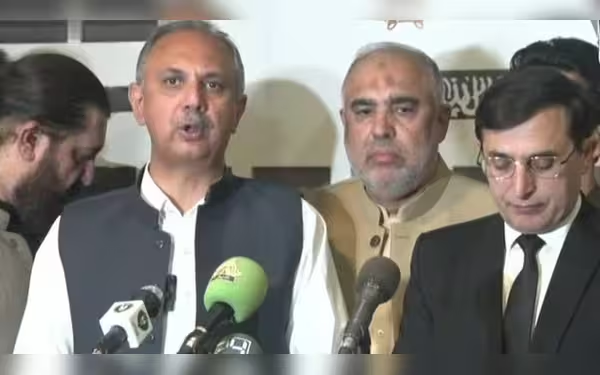Saturday, November 16, 2024 05:39 PM
PTI Accuses Government of Turning Parliament into Rubber-Stamp Institution
- PTI claims parliament is being silenced by the government.
- Supreme Court amendments raise concerns over judicial integrity.
- JUI-F warns of military's expanding role in governance.
 Image Credits: geo
Image Credits: geoPTI criticizes government for passing bills, claiming it undermines democracy and transforms parliament into a rubber-stamp institution.
In recent developments within Pakistan's political landscape, the government has faced significant backlash from the Pakistan Tehreek-e-Insaf (PTI) party regarding a series of bills that have been swiftly passed through the National Assembly and the Senate. These bills, which include amendments related to the Supreme Court and various branches of the military, have sparked accusations from PTI Chairman Barrister Gohar Ali Khan, who claims that the government is transforming the parliament into a "rubber-stamp" institution.
During a press conference held outside the Parliament House, Barrister Gohar expressed his discontent, stating, "Pakistan’s parliament is being made rubber-stamp. [Opposition’s] voice in the House is being silenced. This monarchy cannot be the fate of the Pakistani nation." His comments reflect a growing concern among opposition parties that the legislative process is being undermined, with the government pushing through significant changes without adequate debate or consideration.
The bills that have been passed include the "Supreme Court Number of Judges (Amendment) Bill, 2024," which aims to increase the number of judges in the Supreme Court to 34. This move is purportedly intended to address the backlog of cases, but critics argue that it is a strategic effort by the government to appoint a Chief Justice of their choosing. Barrister Gohar emphasized the importance of maintaining the integrity of the judicial system, stating, "A state has three pillars; if you weaken one pillar, you are weakening the whole state." He warned that such actions could lead to a deterioration of the democratic framework in Pakistan.
In addition to the Supreme Court amendments, other bills passed include changes to the Pakistan Army, Air Force, and Navy, which have raised eyebrows among political analysts and citizens alike. The PTI leader firmly stated that the people of Pakistan reject any legislation that could steer the country towards a monarchy, highlighting a widespread sentiment against perceived authoritarianism.
Adding to the controversy, Jamiat Ulema-e-Islam Fazl (JUI-F) chief Maulana Fazlur Rehman has also voiced concerns regarding the government's intentions. He revealed plans to amend the Anti-Terrorism Act, suggesting that the military would be granted powers that extend beyond its professional responsibilities. He criticized the government for what he described as a move towards civil martial law, stating, "This is a black stain on the face of democracy." His remarks underscore the fears that the military's role in governance is expanding, potentially undermining civilian authority.
As the political climate in Pakistan continues to evolve, the implications of these legislative changes remain to be seen. The ongoing debate surrounding the balance of power between the government, military, and judiciary is crucial for the future of democracy in the country. Citizens and political leaders alike must remain vigilant to ensure that the principles of democracy are upheld and that the voices of the opposition are not stifled. The situation calls for a collective effort to foster a political environment where transparency, accountability, and respect for democratic processes prevail.













